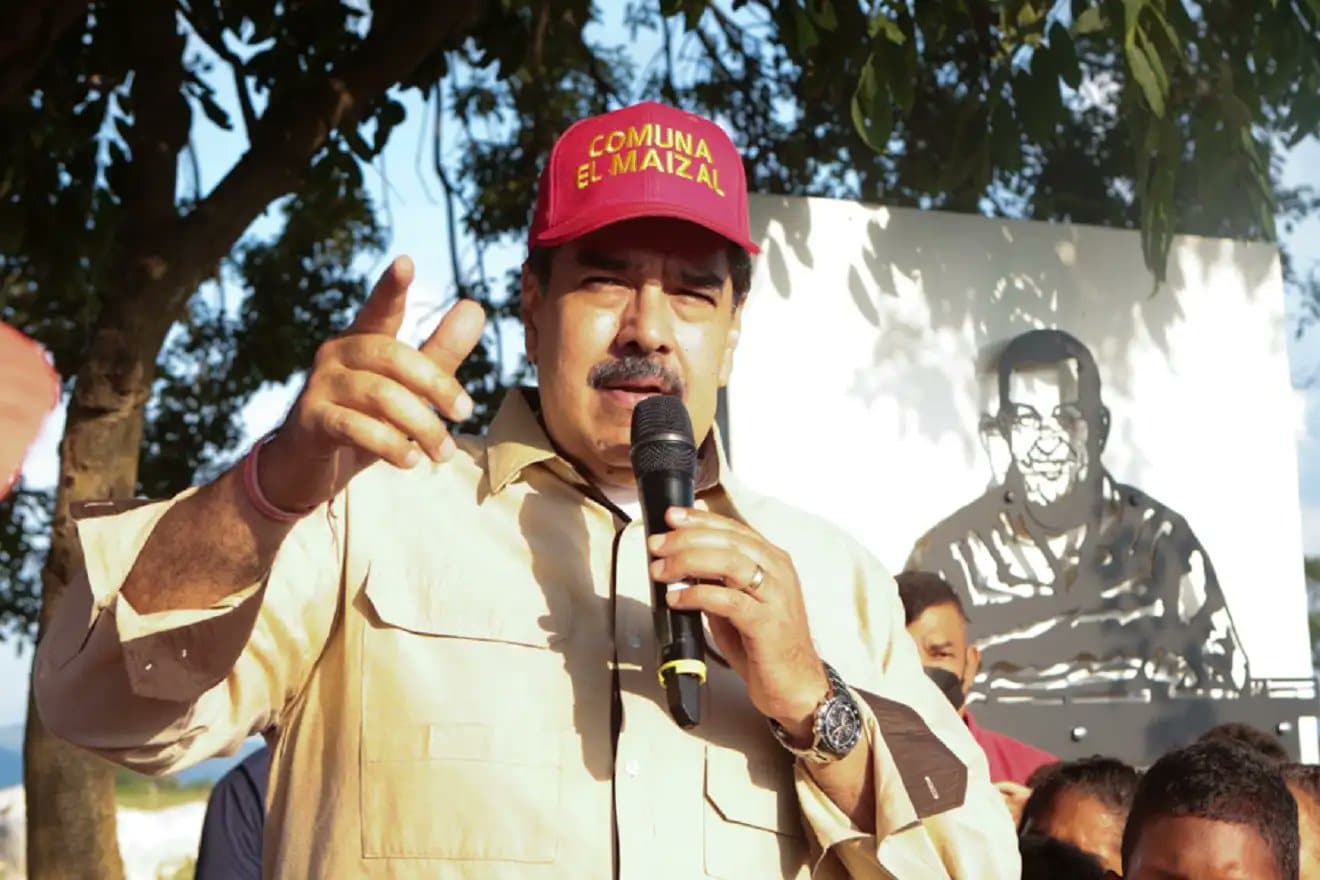
Venezuelan President Nicolas Maduro during a recent visit to El Maizal commune, Lara state, with a drawing of Hugo Chávez behind him. Photo: Presidential Press.

Orinoco Tribune – News and opinion pieces about Venezuela and beyond
From Venezuela and made by Venezuelan Chavistas

Venezuelan President Nicolas Maduro during a recent visit to El Maizal commune, Lara state, with a drawing of Hugo Chávez behind him. Photo: Presidential Press.
This Tuesday, November 15, the president of Venezuela, Nicolás Maduro, launched the national initiative for public consultation for the transformation of the Popular Power laws.
During the launch of the national deployment, the head of state called for Venezuelans to discuss and activate plans to adapt and renew all the laws of Popular Power that have been created during the Revolution, and all the public policies of the government and the state.
Maduro is requesting a review of more than 10 legal instruments of the popular grassroots organizations in order to create a legal system that facilitates the processes and provides the necessary impetus to the Popular Power, the communes, the communal councils and the communal government.
“The laws must be revised to make the processes of these instruments simpler, so that bureaucratism cannot become entrenched,” President Maduro said.
The review aims to diagnose any failures in the current system and to pose a set of questions that must be resolved. These questions include, for example: “What does the national government not do that should be done in order to constitute a true government of People’s Power? What do the ministers and the ministries not do that they should do to be true ministries of People’s Power? What are governors not doing? What are municipalities not doing?”
Maduro noted that these laws of Popular Power have been building the new architecture of the new state, that is, “the state of justice, the democratic state, the participatory state, the rule of law, that some call ‘the communal State.'”
When describing the legal instruments of Popular Power, he referred to the following legal documents:
• Organic Law of Popular Power
• Organic Law of Public and Popular Planning
• Organic Law of Social Comptrollership
• Organic Law of the Communal Economic System
• Organic Law of the Communes
• Organic Law of Communal Councils
• Public Procurement Law
• Organic Law of the Federal Council of Governance
• Law of Jurisdiction of the Peace Justice
• Law on Transfer of Powers and other Attributions of People’s Power
• Alternative and Popular Communication Law
• Organic Law of the National Communal Parliament
• Law of Social Production for Housing and Habitat
• Cooperatives Law
Renewal in current times
The president explained that the renewal process aims to adapt the laws to the new times.
From Miraflores Palace, President Maduro recalled that in the Blue Book written in 1990, Commander Hugo Chávez spoke of popular democracy. “In Venezuela, we have shown that it is possible to make a popular, anti-oligarchic, anti-capitalist, and anti-imperialist revolution,” said Maduro. “That is our identity.”
The president said that in Venezuela, the revolution is undergoing a new process of renovation towards socialism: “For us, the construction of leading democracy, our democracy, is vital … Our process is the Revolution. It is the revolution of the 21st century, it is the revolution of our historical roots, it is the revolution of our origins.”
President Maduro also recalled how Chávez described democracy as participatory and “protagonist,” meaning that the people must be the main active force of democracy.
Maduro noted that the 1999 Constitution of the Bolivarian Republic of Venezuela is the most complete work in terms of participatory and protagonist democracy. “We should all feel proud,” he said.
“Say what they want about Venezuela, say what they want about Maduro, but Venezuela and the Revolution follow their own path of democracy, original, Robinsonian, Zamoran, popular, Bolivarian, and socialist,” he added.
President Maduro said that in the year 2023, Venezuela “will overcome and heal the wounds of the economic war and sanctions and continue advancing in the expansion of the productive forces of the country and the communal power of Venezuela.”
“We need to seek early and permanent results and victories, and incorporate all of the country’s public opinion into this debate, this revolutionization of People’s Power,” Maduro said. “We cannot fail.”
The president expressed his desire that Venezuelans build a renewing set of policies linked to the people: “We cannot allow an individualistic, egocentric, capricious model to emerge.”
Venezuela builds its own history
During the activity that took place in the Boyacá Room of Miraflores Palace, Maduro affirmed that the world recognizes the rebellion with which Venezuela builds its own history.
“Why do you think they shake my hand in the world?” Maduro said. “It is for the people, the history, our rebellion … And we have achieved our history by hand.”
(Últimas Noticias) by Carlos Eduardo Sanchez
Translation: Orinoco Tribune
OT/JRE/SL